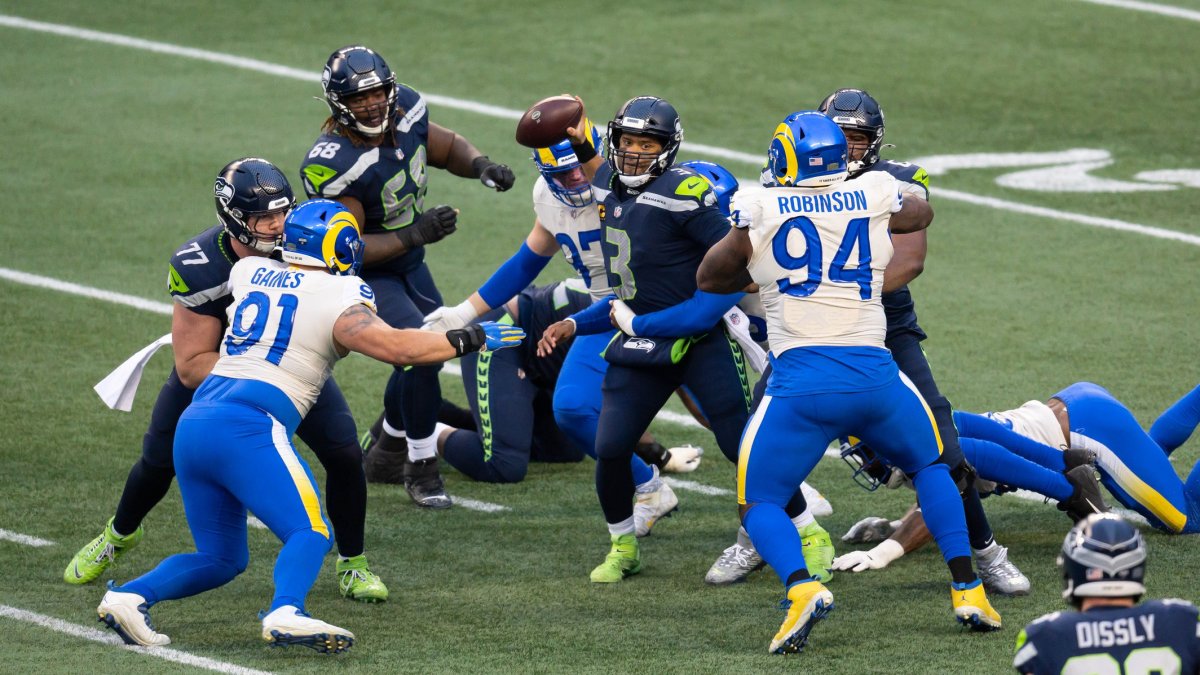Russell Wilson is reportedly unhappy with how things are going in Seattle, and the specificity of his gripes are interesting given his style of play and the dynamics between him and the team since he came into the league.
Wilson is tired of getting sacked and hit so much, but the biggest fix that can be made to that might be one he can make himself. If he’s tired of getting hit, he should stop taking so many hits.
Landing Wilson in the third round of the draft in 2012 was one of the best things that have ever happened to the franchise, but that doesn’t mean he is blameless in all scenarios. His arrival transformed the Seahawks and opened a Super Bowl window that enabled them to make two trips to the big dance in rapid succession, winning one and coming up one play short of a second.
Wilson's talent and almost unique playstyle have also allowed the Seahawks to apply unusual approaches to team building. Since he arrived, Seattle hasn’t ranked higher than 15th in terms of salary cap dollars allocated to the offensive line, and their average position is 26th.
Wilson has made a career out of extending plays, making magic happen outside of the structure of the offense and escaping pressure when it comes, so the team could eschew the money most teams allocate to the line to protect their biggest asset and instead focus on other areas of the squad, knowing that Wilson could make up the shortfall.
The offensive line has been bad, but that’s only part of the story. Wilson has never been behind a line that ranked in the top half of the league in PFF pass-blocking grade, and his line has ranked either 30th or 32nd in five of his seasons.
By comparison, Patrick Mahomes has had a line ranked in the top half of the league every season of his career — even this past season as injuries bit deep. Aaron Rodgers has had a line ranked in the top half in 12 out of his 13 seasons.
The Seahawks leaned into how Wilson plays and skimped on the line, which had inevitable consequences.
The issue with the Seahawks quarterback's style of play is that it cuts both ways. Wilson’s tendency, or even conscious strategy, of dropping beyond the pocket and buying time and space in the backfield to find a bigger play certainly results in some spectacular highlights, but it also stresses the pass protection that Seattle has economized on.
The relationship between the quarterback and his pass blocking is a symbiotic one, with each part needing help from the other. A whiff from an offensive lineman can put a defender in Wilson’s face and cause him to miss on a throw that otherwise would have been completed. At the same time, Wilson either dropping to a landmark beyond where the offensive line is blocking or running away from their leverage can undo an otherwise perfectly solid rep of pass protection.
We tend to think that anything to do with pressure is a reflection of the offensive line and pass protection, but PFF has shown that quarterbacks actually control their pressure rate more than any other single factor.
Exclusive content for premium subscribers

WANT TO KEEP READING?
Dominate Fantasy Football & Betting with AI-Powered Data & Tools Trusted By All 32 Teams
Already have a subscription? Log in




 © 2025 PFF - all rights reserved.
© 2025 PFF - all rights reserved.